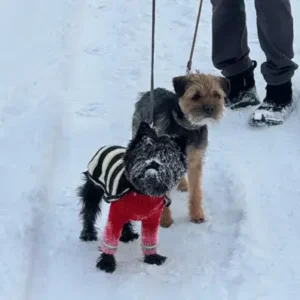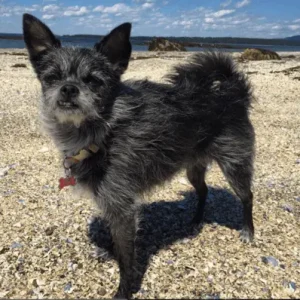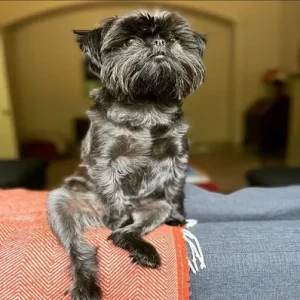Shih-Poo History/Origin
The Shih-Poo is a relatively modern designer breed, created by crossing the Shih Tzu and Toy. This hybrid dog gained popularity in the late 20th century as demand for hypoallergenic, small companion dogs increased.
While their exact origins are unclear, the Shih-Poo was bred to combine the Poodle’s intelligence and low-shedding coat with the Shih Tzu’s friendly and loyal nature. Though not recognized by major kennel clubs, they are cherished as affectionate and adaptable pets worldwide.
Shih-Poo Personality
Shih-Poos inherit a mix of traits from their Shih Tzu and Poodle parents. Shih Tzus are friendly, attentive, and charming, though they can sometimes be stubborn. Poodles is one of the dog breeds known for their intelligence, trainability, and active nature. Shih-Poo temperament typically combines these qualities, resulting in dogs that are friendly, playful, and moderately energetic.
Their small size and lap-dog tendencies make them perfect companions for snuggles and downtime. They may not be overly eager to learn tricks but thrive on attention and interaction.
- Potential Challenges
Shih-Poos may exhibit some stubbornness, making training occasionally challenging. While they are less vocal than Poodles, they may bark to express displeasure, such as when meals are late. Early training and socialization are essential to curb undesirable behaviors.
Consistency and positive reinforcement are effective in fostering well-behaved Shih-Poo dogs. Regular engagement and attention are crucial to ensure they remain happy and well-adjusted.
Shih-Poo Physical Appearance
The Shih-Poo is often affectionately called the “teddy bear” of dogs, and it’s easy to see why. With a cute button nose, small, expressive eyes, and short floppy ears that hang halfway down its face, this breed exudes charm. Their friendly and playful expression adds to their endearing appearance, making them a favorite among dog lovers.
- Size
Shih-Poos are typically 8 to 13 inches tall and weigh between 12 to 20 pounds. Their compact size makes them ideal for small living spaces like apartments while still being sturdy enough for active play. This size range adds to their versatility as both lap dogs and energetic companions.
- Coat color
The Shih Tzu Poodle mix has a coat that varies in colors, patterns, and textures, influenced by its genetic makeup. Common coat colors include black, white, gray, brindle, or combinations of these.
Like other Poodle mixes, Shih-Poos are low-shedding, but this doesn’t guarantee they’re completely hypoallergenic. Regular grooming is essential, especially for those with Poodle-like coats, to prevent matting and maintain their appearance.
Fawn Shih-Poo- Source: penny_shihpoo
White Shih-Poo- Source: rufus_the.shihpoo
Black and White Shih-Poo- Source: shihpoo
Black Shih-Poo- Source: shihpoo
Shih-Poo Gender Differences
Male and female Shih-Poos share similar average heights, weights, and lifespans, and both are known for being affectionate and loyal.
However, males tend to be more affectionate, attentive, and accepting, often seeking more interaction with their owners. In contrast, females are typically confident, dominant, assertive, and sometimes stubborn. But they are no less charming or lovable, bringing their unique personalities to the mix.
Shih-Poo Feed/Nutrition
Shih-Poos need a balanced diet suited to their age, size, activity level, and health. High-quality dog food, whether commercial or vet-guided home-prepared, is essential. Oranges can also be given as a healthy snack in moderation. Their meals should include proteins, fats, carbohydrates, and necessary vitamins.
Portion control is key to preventing obesity, and dietary needs vary by life stage:
- Puppies (2-12 months): 4 meals/day
- Adults (1-7 years): 2 meals/day,
- Seniors (7+ years): 2 smaller meals/day,
Shih-Poo Health
Like all dog breeds, Shih-Poos can be prone to specific health conditions influenced by their Shih Tzu and Poodle genetics. Common concerns include:
- Dental Issues: Dental problems, such as tartar buildup, gum disease, and tooth decay, are common in Shih-Poos. Left untreated, these can lead to pain and tooth loss. To prevent issues, regular dental care is essential, including brushing, dental chews, and routine veterinary check-ups.
- Ear Infections: Shih-Poos’ floppy ears can trap moisture and limit airflow, making them prone to infections. Signs include redness, discharge, or an unpleasant smell. Preventative measures include regular ear cleaning, keeping ears dry, and seeking veterinary care if infections occur.
- Patellar Luxation: This condition occurs when the kneecap dislocates from its normal position, causing limping or discomfort. It is more common in small breeds like Shih-Poos. Preventive care includes maintaining a healthy weight and monitoring activity levels, with surgical intervention for severe cases.
- Respiratory Issues: Brachycephalic features, inherited from Shih Tzus, can cause snorting, snoring, or breathing difficulties, especially in hot or humid conditions. Avoid overexertion and extreme temperatures, and seek veterinary care for pronounced symptoms.
- Progressive Retinal Atrophy: PRA is a degenerative eye condition that leads to vision loss over time. Early signs include night blindness and difficulty navigating in dim light. Regular veterinary eye exams can help with early detection, and while there is no cure, management strategies can improve the dog’s quality of life.
- Hip Dysplasia: Hip dysplasia occurs when the hip joint doesn’t develop properly, leading to pain and reduced mobility. It can be hereditary or caused by environmental factors like overexertion during growth. Preventive measures include maintaining a healthy weight, avoiding excessive exercise in puppies, and considering joint supplements or physical therapy as needed.
Shih-Poo Care and Grooming
Grooming a Shih-Poo involves regular care of their coat, ears, nails, teeth, and eyes to maintain their health and appearance. Shih-Poo Coat maintenance depends on whether they inherit the Poodle’s curly coat or the Shih Tzu’s silky coat.
Brush their coat 2-3 times per week (or daily for curlier coats) using a slicker or pin brush to prevent tangles and matting, especially in areas like behind the ears and under the legs. Bathe them every 4-6 weeks with a gentle dog shampoo, followed by thorough drying to avoid skin irritation.
Trim their nails every 4-6 weeks with dog nail clippers or a grinder, being careful not to cut them quickly. This breed requires regular grooming to stay healthy and happy.
Shih-Poos need moderate daily exercise, like a 30-minute walk or play session, to stay healthy and happy. Incorporating dog training tips during these sessions helps with mental stimulation and bonding. By combining regular exercise with positive reinforcement, you can keep your Shih-Poo fit, well-behaved, and content.
Shih-Poo Rescue Groups
If you’re considering adopting a Shih-Poo, reaching out to rescue groups is a wonderful option. Since the Shih-Poo is a designer breed, it’s often best to look into parent breed-specific rescues, such as those for Shih Tzus or Poodles, as they may have Shih-Poos in need of loving homes. Many rescues work hard to place dogs with the right families, ensuring they are healthy, well-adjusted, and ready to be part of your home.
Shih Poo Price
The price of a Shih Poo typically ranges from $2,200 to $4,500, depending on factors such as breeder reputation, pedigree, and location.
When considering a Shih-Poo for sale, it’s important to choose a breeder who follows ethical breeding practices. Responsible breeders prioritize the health and well-being of their dogs, ensuring that both parent dogs are tested for common genetic health issues and raised in a loving environment.
Interesting Facts
- Due to their affectionate nature, Shih-Poos often make excellent emotional support animals. Their ability to bond closely with their owners makes them ideal for providing comfort.
- Shih-Poos tend to maintain their puppy-like behavior well into adulthood, often staying playful and energetic as they age.
Best For
The Shih-Poo is best suited for individuals or families looking for a loving, low-maintenance companion. They thrive in homes where they receive plenty of attention and affection, making them ideal for first-time dog owners or those with a more relaxed lifestyle. Their small size and moderate exercise needs make them a great choice for apartment dwellers or those without large outdoor spaces. Shih-Poos are especially suited for people who are home often and can provide consistent interaction and training.
Top Names
| Male Shih-Poo Names | Female Shih-Poo Names |
| Max | Bella |
| Charlie | Daisy |
| Toby | Luna |
| Oliver | Rosie |
| Cooper | Zoe |









 Shih Tzu- Source:
Shih Tzu- Source:  Toy Poodle- Source:
Toy Poodle- Source: 

 Fawn Shih-Poo- Source:
Fawn Shih-Poo- Source:  White Shih-Poo- Source:
White Shih-Poo- Source:  Black and White Shih-Poo- Source:
Black and White Shih-Poo- Source:  Black Shih-Poo- Source:
Black Shih-Poo- Source: 







